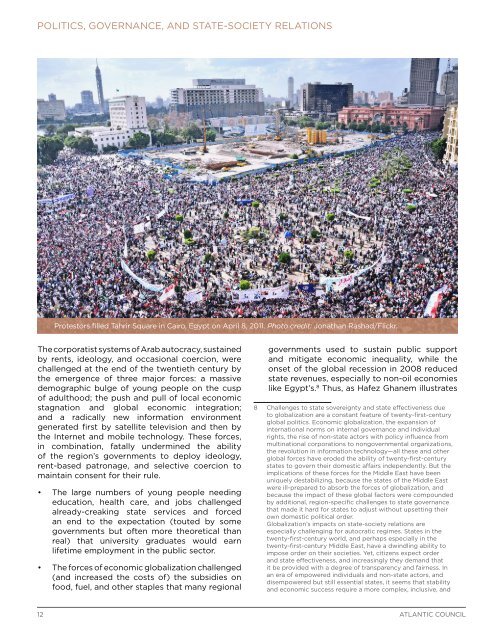POLITICS GOVERNANCE STATE-SOCIETY RELATIONS
Politics_Governance_and_State-Society_Relations_web_1121
Politics_Governance_and_State-Society_Relations_web_1121
You also want an ePaper? Increase the reach of your titles
YUMPU automatically turns print PDFs into web optimized ePapers that Google loves.
<strong>POLITICS</strong>, <strong>GOVERNANCE</strong>, AND <strong>STATE</strong>-<strong>SOCIETY</strong> <strong>RELATIONS</strong><br />
Protestors filled Tahrir Square in Cairo, Egypt on April 8, 2011. Photo credit: Jonathan Rashad/Flickr.<br />
The corporatist systems of Arab autocracy, sustained<br />
by rents, ideology, and occasional coercion, were<br />
challenged at the end of the twentieth century by<br />
the emergence of three major forces: a massive<br />
demographic bulge of young people on the cusp<br />
of adulthood; the push and pull of local economic<br />
stagnation and global economic integration;<br />
and a radically new information environment<br />
generated first by satellite television and then by<br />
the Internet and mobile technology. These forces,<br />
in combination, fatally undermined the ability<br />
of the region’s governments to deploy ideology,<br />
rent-based patronage, and selective coercion to<br />
maintain consent for their rule.<br />
• The large numbers of young people needing<br />
education, health care, and jobs challenged<br />
already-creaking state services and forced<br />
an end to the expectation (touted by some<br />
governments but often more theoretical than<br />
real) that university graduates would earn<br />
lifetime employment in the public sector.<br />
• The forces of economic globalization challenged<br />
(and increased the costs of) the subsidies on<br />
food, fuel, and other staples that many regional<br />
governments used to sustain public support<br />
and mitigate economic inequality, while the<br />
onset of the global recession in 2008 reduced<br />
state revenues, especially to non-oil economies<br />
like Egypt’s. 8 Thus, as Hafez Ghanem illustrates<br />
8 Challenges to state sovereignty and state effectiveness due<br />
to globalization are a constant feature of twenty-first-century<br />
global politics. Economic globalization, the expansion of<br />
international norms on internal governance and individual<br />
rights, the rise of non-state actors with policy influence from<br />
multinational corporations to nongovernmental organizations,<br />
the revolution in information technology—all these and other<br />
global forces have eroded the ability of twenty-first-century<br />
states to govern their domestic affairs independently. But the<br />
implications of these forces for the Middle East have been<br />
uniquely destabilizing, because the states of the Middle East<br />
were ill-prepared to absorb the forces of globalization, and<br />
because the impact of these global factors were compounded<br />
by additional, region-specific challenges to state governance<br />
that made it hard for states to adjust without upsetting their<br />
own domestic political order.<br />
Globalization’s impacts on state-society relations are<br />
especially challenging for autocratic regimes. States in the<br />
twenty-first-century world, and perhaps especially in the<br />
twenty-first-century Middle East, have a dwindling ability to<br />
impose order on their societies. Yet, citizens expect order<br />
and state effectiveness, and increasingly they demand that<br />
it be provided with a degree of transparency and fairness. In<br />
an era of empowered individuals and non-state actors, and<br />
disempowered but still essential states, it seems that stability<br />
and economic success require a more complex, inclusive, and<br />
12 ATLANTIC COUNCIL



